Episodes

Thursday Apr 23, 2020
Thursday Apr 23, 2020
In part two of our conversation, Jonathan Weitzman talks about how he envisions career building in academia and talks about different projects he's championed at the Université de Paris aimed at preparing his students for their professional life and empowering them during their graduate studies.
Jonathan Weitzman is a professor of genetics at the Université de Paris, founding director of the Centre for Epigenetics and Cell Fate, and director of the Magistère Masters in Genetics Porgram.
Join the Papa PhD Postgraduate Career Exploration Group!
What you’ll learn about in this episode:
Why you shouldn't be afraid of having "holes" in your CVHow interdisplinary projects can enrich your science and open your vistasJonathan's view on the future of academiaThere is no single right way to build your careerThis episode’s pearls of wisdom:“We're experimentalists, we should experiment more with our careers.”“One thing that is really striking every year is that the students want very simple answers to questions like "Do I need to do a PhD or not? Should I do a second master's or not?" And they always ask "do you recruit people with a master's or with a PhD?" And the entrepreneurs always look at them like: "I don't understand the question – we're looking for people with skills".”“There's no golden path. Everyone gets where they're doing differently. There's so many ways to get there and you have to enjoy the journey.”“I really think this is the future of academia, is to create better interdisciplinary. We're seeing it with the whole COVID thing. It's not just about virology and it's not just about drug development, and it's not just about epidemiology, and it's not just about politics. It's about how these things come together.”Jonathan's links: Twitter – @Epigenetique; LinkedIn.com/in/JonathanWeitzman; TEDx Talk – Who am I ? Learning to read the genes in your unique genome book.g
Leave a review on Podchaser !
Support the show on Patreon !
You might also like the following episodes:
Chris Kent – Biotech Startup CEO: PapaPhD.com/11Sathy Rajasekharan – Science communication: PapaPhD.com/16Fábio Rosa (PhD student), Gil Costa (scientific illustrator), Patrícia Monteiro (principal investigator): PapaPhD.com/24Margaret Magdesian – Biotech Startup CEO: PapaPhD.com/21
Launching your podcast?
If you're preparing to launch your podcast, you may be asking yourself what hosting platform to use.
I launched Papa PhD on Bluebrry because I wanted a professional service that would interface with my WordPress website, that would robustly broadcast Papa PhD to all platforms, and that would allow me to grow my podcast in years to come.
And these are the reasons why I'm recommending the Blubrry podcast hosting and syndication platform.
Click on the button below or use the promo code PapaPhDBlue on the Blubrry website to unlock a one month free trial:
Try one free month with Blubrry !
If you are starting a serious podcast project, do consider one of the first podcasting hosts out there, offering state of the art services, including IAB certified statistics, based on years of experience in the podcasting space.
Happy podcasting!
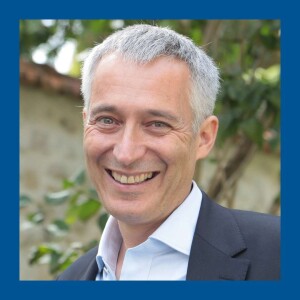
Thursday Apr 23, 2020
Thursday Apr 23, 2020
Even academic and professional paths that look straighforward from afar and in hindsight were built on highs and lows, opportunities, obstacles, time-outs. Today's conversation illustrates this perfectly and shows how these irregularities are part of what makes the journey interesting.
Jonathan Weitzman is a professor of genetics at the Université de Paris, founding director of the Centre for Epigenetics and Cell Fate, and director of the Magistère Masters in Genetics Porgram.
Join the Papa PhD Postgraduate Career Exploration Group!
What you’ll learn about in this episode:
Plans can and will change – be ready to adapt
The importance of taking your time to mature as a researcher
What you can gain by taking career training while in graduate school
How universities are changing the way they look at the potential of PhDs
Jonathan's unique approaches to graduate training
The opportunities and outlets that exist today for scientific writing and science communication
The importance of trying different things during graduate school to learn not only what you like, but what you're good at
This episode’s pearls of wisdom:
“When I became a professor, it was the beginning of a transition where we were being more honest with the students about the fact that most of them would not go into academic careers. And what we're trying to defend today is the idea that the PhD is just an excellent training for any career. That being in a lab and having a research project, and all the ups and downs of a PD is just a fantastic training for anything afterwards.”
“I think there is a transition in many science-related careers. If you were the science correspondent of a national newspaper 20 years ago, you didn't need a PhD. Today, you need a PhD. If you were a patent lawyer, even in the life sciences, 20 years ago you didn't need a PhD. Today, you do. So there are many professions where today, if you want to do those successfully and compete you need to have a PhD, whether it is patent law, whether it is science communication, and I could go on and on.”
Jonathan's links: Twitter – @Epigenetique; LinkedIn.com/in/JonathanWeitzman; TEDx Talk – Who am I ? Learning to read the genes in your unique genome book.
Leave a review on Podchaser !
Support the show on Patreon !
You might also like the following episodes:
Chris Kent – Biotech Startup CEO: PapaPhD.com/11
Sathy Rajasekharan– Science communication: PapaPhD.com/16
Fábio Rosa (PhD student), Gil Costa (scientific illustrator), Patrícia Monteiro (principal investigator): PapaPhD.com/24
Margaret Magdesian – Biotech Startup CEO: PapaPhD.com/21
Launching your podcast?
If you're preparing to launch your podcast, you may be asking yourself what hosting platform to use.
I launched Papa PhD on Bluebrry because I wanted a professional service that would interface with my WordPress website, that would robustly broadcast Papa PhD to all platforms, and that would allow me to grow my podcast in years to come.
And these are the reasons why I'm recommending the Blubrry podcast hosting and syndication platform.
Click on the button below or use the promo code PapaPhDBlue on the Blubrry website to unlock a one month free trial:
Try one free month with Blubrry !
If you are starting a serious podcast project, do consider one of the first podcasting hosts out there, offering state of the art services, including IAB certified statistics, based on years of experience in the podcasting space.
Happy podcasting!

Thursday Apr 16, 2020
Thursday Apr 16, 2020
Dans cette deuxième partie de l'entrevue avec Martin Primeau, on a discuté plus en détail de la profession de communicateur scientifique dans le milieu journalistique et dans un milieu institutionnel et Martin a partagé ses conseils pour une transition sereine et productive vers la vie professionnelle après la maîtrise ou le doctorat.
Spécialiste de la communication scientifique, Martin Primeau œuvre présentement comme conseiller en relations médias à Polytechnique Montréal. Titulaire d'un doctorat en biologie cellulaire de l'Université McGill et d'une maîtrise en biochimie de l'Université de Montréal, il avait accroché son sarrau en 2010 pour se consacrer à une carrière en journalisme, écrivant notamment pour LaPresse+, les magazines les Débrouillards et l'hebdomadaire agricole La Terre de Chez Nous. Il a aussi préparé des reportages télé pendant 3 ans pour l'émission de vulgarisation scientifique Le Code Chastenay à Télé-Québec en plus de consacrer une bonne partie de son temps à la rédaction de textes pour le milieu des affaires.
Joignez-vous au groupe d'exploration de carrières Papa PhD !
Ce que vous apprendrez dans cet épisode :
Les défis auxquels peut s'affronter un journaliste scientifique
La question des fausses représentations soi-disant scientifiques ou des instrumentalisations biaisées de résultats scientifiques dans les médias
L'intérêt essayer des choses avec lesquelles on n'est pas familier
L'importance de faire du bénévolat dans votre domaine d'intérêt pour développer des compétences connexes
Le rôle du métier de journaliste
L'effet accélérateur de la bourse Fernand Séguin pour ceux qui désirent faire du journalisme scientifique
Les magazines et autres publications universitaires comme rampes de lancement dans le domaine journalistique
Les perles de sagesse de Martin :
« Oui, nos scientifiques doivent parler. Souvent, ce qui les retient de parler, c'est, justement que comme scientifique on apprend à se limiter aux faits et pas nécessairement à donner notre opinion. Et puis, des fois, ça fait en sorte qu'on pense qu'on n'a pas à dire un mot sur une question qui est d'intérêt public parce que, dans le fond, ça sort un petit peu de notre expertise. »
« Certain que c'est une bonne idée d'aller acquérir des nouvelles compétences parce que par l'exercice, en essayant, par exemple, de rédiger, on acquiert des compétences, on apprend, on vit une expérience qui est différente de celles auxquelles on est confronté dans la vie de tous les jours. Si on n'élargit pas sa zone de confort, eh bien, on ne grandit pas. Il ne faut pas hésiter à repousser les frontières, à essayer des choses avec lesquelles on n'est pas familer. Et puis on se découvre, en même temps. »
Les liens de Martin : Linkedin.
Laissez une évaluation sur Podchaser !
Soutenez Papa PhD sur Patreon !
Vous aimerez aussi ces épisodes :
Carine Monat – Journalisme scientifique : PapaPhD.com/40
Kirsten Sanford – Communication scientifique (anglais) : PapaPhD.com/13
Simon Landry – Courtier de connaissances : PapaPhD.com/14
Valérie Levée – Journalisme : PapaPhD.com/38
Envie de lancer un podcast?
Mon ami et collègue podcasteur Marco Bernard et son Académie du Podcast ont ce qu'il vous faut si vous avez une idée, mais qu'il vous manque les connaissances pour mettre en place votre podcast.
Dans la formation Podcasting 101, Marco a préparé plus de 20 vidéos et des tutoriels où il explique quel équipement se procurer, comment faire le montage et comment le mettre en ondes sur les principales plateformes. Cliquez maintenant pour vous inscrire et avoir accès à la communauté !
Formation Podcasting 101 de l'Académie du Podcast
Dans la formation Podcaster Pro, il a pensé aux professionnels et créateurs qui non seulement veulent lancer leur podcast, mais ont des objectifs précis à atteindre avec celui-ci. C'est en pensant à eux qu'il a préparé plus de 80 vidéos et des tutoriels où il explique non seulement comment lancer son podcast,
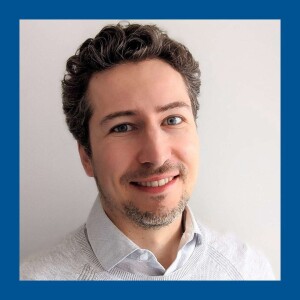
Wednesday Apr 15, 2020
Wednesday Apr 15, 2020
Dans l'épisode d'aujourd'hui de Papa PhD, je partage avec vous la première partie d'une conversation très agréable qui s'est déroulée en personne au Café Java Mythe, dans le quartier de Villeray, à Montréal, avec Martin Primeau. Au long de cette première partie, on a discuté tu trajet académique de Martin et de comment il a cultivé sa passion pour le journalisme et préparé son entrée dans ce domine passionnant de la communication scientifique.
Spécialiste de la communication scientifique, Martin Primeau œuvre présentement comme conseiller en relations médias à Polytechnique Montréal. Titulaire d'un doctorat en biologie cellulaire de l'Université McGill et d'une maîtrise en biochimie de l'Université de Montréal, il avait accroché son sarrau en 2010 pour se consacrer à une carrière en journalisme, écrivant notamment pour LaPresse+, les magazines les Débrouillards et l'hebdomadaire agricole La Terre de Chez Nous. Il a aussi préparé des reportages télé pendant 3 ans pour l'émission de vulgarisation scientifique Le Code Chastenay à Télé-Québec en plus de consacrer une bonne partie de son temps à la rédaction de textes pour le milieu des affaires.
Joignez-vous au groupe d'exploration de carrières Papa PhD !
Ce que vous apprendrez dans cet épisode :
Oui – vous pouvez mettre votre doctorat en pauseLe potentiel d'initiatives telles que la bourse Fernand SéguinLa valeur des stages et des formations pour la réorientation de votre carrièreComment ce que vous faites aujourd'hui peut avoir des retombées inattendues plus tard dans votre parcours professionnelLe cheminement académique n'est pas pour tous – et c'est OK.Se détacher de ses résultats comme technique pour maintenir l'équilibre émotionnel et mentalL'effet pernicieux que peut avoir la vie dans le microcosme qu'est un laboratoire de recherche pour notre image de nous-même et de notre succèsLes perles de sagesse de Martin :« Il y a de la science, encore, dans nos médias écrits, mais il y en a de moins en moins et une façon d'en parler, à mon avis, c'est à travers le cahier "Affaires" où on a à parler d'entreprises de haute technologie, des pharmaceutiques, des biotechs. »« Les gens de l'extérieur ne perçoivent pas une personne qui a abandonné un doctorat ou qui a arrêté à la maîtrise comme étant une personne qui a vécu un échec. Et puis la vie nous prépare – il y a tellement à apprendre dans le milieu du travail, des choses qu'on n'apprend pas en étant aux études que de multiplier le nombres d'expériences, c'est vraiment là qu'on fait des gains, dans le fond. »« [En tant que PhD] des gens que j'ai croisé avaient comme appréhension, par exemple, que dans mon style d'écriture, comme journaliste, j'allais être très froid, très cartésien. Je suis quand même cartésien, mais je vis quand même des émotions et je suis capable de transposer des émotions dans mes textes. Et ça, on me disait qu'on avait été surpris de ça, mais c'est ça – on n'est pas des robots, on est des humains comme d'autres. »« Il faut se le dire: il y a une forme de plafond de verre – on forme des étudiants au doctorat, c'est-à-dire, puis des doctorants et puis, au final, il y a seulement une partie de ceux-là qui ont une place en académie. Les professeurs qui sont embauchés ont des postes à vie, donc les places sont limitées. Je n'avais pas le goût de m'éloigner de Montréal, ma vie est ici. Et puis j'avais des amis, aussi, qui étaient partis, plus âgés, qui avaient fait des post-doc, puis qui restaient à l'étranger pendant plusieurs années. Ils cherchaient à revenir – impossible pour eux... Je ne voulais pas vivre ça. »Les liens de Martin : Linkedin.
Laissez une évaluation sur Podchaser !
Soutenez Papa PhD sur Patreon !
Vous aimerez aussi ces épisodes :
Carine Monat – Journalisme scientifique : PapaPhD.com/40Kirsten Sanford – Communication scientifique (anglais) : PapaPhD.com/13Simon Landry – Courtier de connaissances : Pap...

Thursday Apr 09, 2020
Thursday Apr 09, 2020
Warning: Please note that this episode mentions different mental health issues, including suicidal ideation.
Susanna L. Harris is a PhD student at the University of North Carolina in Chapel Hill where she studies how different types of bacteria stick to the roots of plants. Susanna started PhD Balance to empower academics during and after Grad School, with a special focus on supporting academics' mental health. Susanna can be found on Instagram and Twitter at @susannalharris while PhD Balance can be found at @PhD_Balance and at www.PhDBalance.com.
Join the Papa PhD Postgraduate Career Exploration Group!
What you’ll learn about in this episode:
How Susanna learned a significant proportion of graduate students were struggling with mental health issues
How she decided to establish a platform to connect with them and how it grew into a community
The important skill of accepting help and support from others
Upcoming PhD Balance initiatives
This episode’s pearls of wisdom:
“I just wanted to make a little space where peolpe could come together and some of us could share our stories – kind of get that catharsis of just saying something out loud.”
“I'm not one in a hundred people – I mean, if there is ten people in a room, there's four of us that are currently struggling.”
“For people who don't know what impostor syndrome is, it's basically the idea that you have somehow ended up in this place where you are at a lower caliber or quality than everyone else around you, and that you're probably about three missteps away from everyone turning and looking at you and outwardly saying "you just don't belong here. You're fraud and suddenly, everything that you have said comes into question and we've realized that you're a liar".”
“The first two steps of getting help for your mental health and building a healthier space for yourself are: first realizing something might not be right or something might be holding you back in terms of your mood, your productivity, your ability to sleep and build relationships. And the second piece is really deciding that it's worth it to get that help, that you're worth it to try to get that help.”
“An advisor is somebody that you go to for a specific situation, a specific set of questions. A mentor is somebody who is going to see your success as, in some way, fulfilling to them and understands that your success does not look like their success. They're not acting as a guide to get you through their path, but rather somebody that can maybe be on the lookout and look around and say "Hey! That might be a good opportunity", or "I seem to see that you're struggling with this obstacle – can I give you some of my perspective?"”
Susanna's links: Twitter – @SusannaLHarris @PhD_Balance; Instagram – @SusannaLHarris @PhD_Balance; LinkedIn.com/in/SusannaLHarris; PhDBalance.com; Susanna's YouTube channel.
Leave a review on Podchaser !
Support the show on Patreon !
You might also like the following episodes:
Élodie Chabrol – Science communication (French): PapaPhD.com/33
Fiona Robinson – Patient education: PapaPhD.com/6
Kelly Bullock – Science illustration: PapaPhD.com/9
Kirsten Sanford – Science communication: PapaPhD.com/13
Launching your podcast?
If you're preparing to launch your podcast, you may be asking yourself what hosting platform to use.
I launched Papa PhD on Bluebrry because I wanted a professional service that would interface with my WordPress website, that would robustly broadcast Papa PhD to all platforms, and that would allow me to grow my podcast in years to come.
And these are the reasons why I'm recommending the Blubrry podcast hosting and syndication platform.
Click on the button below or use the promo code PapaPhDBlue on the Blubrry website to unlock a one month free trial:
Try one free month with Blubrry !
If you are starting a serious podcast project, do consider one of the first podcasting hosts out there, offering state of the art services,
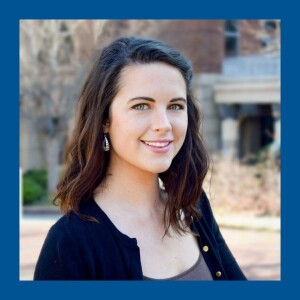
Thursday Apr 09, 2020
Thursday Apr 09, 2020
Warning: Please note that this episode mentions different mental health issues, including suicidal ideation.
When we look around us, it’s easy to think everyone else is doing fine and has a picture perfect life. It’s easy to feel like your peers are better than you, more successful, having a better time. But you’d be surprised… In today’s stressful day-to-day, in particular in graduate school, more people than you imagine are struggling with anxiety and depression. In part one of this week’s episode of Papa PhD, Susanna Harris will be sharing with you her personal experience dealing with depression during her PhD and the lessons this experience has brought her.
Susanna L. Harris is a PhD student at the University of North Carolina in Chapel Hill where she studies how different types of bacteria stick to the roots of plants. Susanna started PhD Balance to empower academics during and after Grad School, with a special focus on supporting academics' mental health. Susanna can be found on Instagram and Twitter at @susannalharris while PhD Balance can be found at @PhD_Balance and at www.PhDBalance.com.
Join the Papa PhD Postgraduate Career Exploration Group!
What you’ll learn about in this episode:
The importance of finding undergrad and graduate programs in domains that interest you
How to reason you way through impostor syndrome in graduate school
How to deal with negative self-talk and with negative talk coming from others
The importance of getting specialized help if you're struggling, especially if you're dealing with mental health issues
Why you should have someone who you can safely share your struggles and your worries with during graduate school
How knowing your yearly mood cycle can help you keep balance
This episode’s pearls of wisdom:
“Do what you think success looks like.”
“Things that support people's mental health are things like having a routined schedule, having very clear goals, then metrics by which to meet them, a clear understanding of expectations, family, friends, loved ones...”
“Going back to the idea of taking care of myself – if you have a pet you don't have a choice of not getting up in the morning, you don't have a choice of staying in your house all day long. And things like – they have to eat twice a day, so I should probably eat at least twice a day... and companionship.”
“Those pieces that we tell people, that sound so fluffy, like "have a support system" or "get enough sleep", or "be introspective" – those are often the hardest, but they really are the pieces that matter.”
Susanna's links: Twitter – @SusannaLHarris @PhD_Balance; Instagram – @SusannaLHarris @PhD_Balance; LinkedIn.com/in/SusannaLHarris; PhDBalance.com.
Leave a review on Podchaser !
Support the show on Patreon !
You might also like the following episodes:
Abel Polese – Area Studies: PapaPhD.com/19
Inês Thomas Almeida – Musicology: PapaPhD.com/27
Joe Makkerh – Entrepreneurship: PapaPhD.com/2
Kirsten Sanford – Science communication: PapaPhD.com/13
Launching your podcast?
If you're preparing to launch your podcast, you may be asking yourself what hosting platform to use.
I launched Papa PhD on Bluebrry because I wanted a professional service that would interface with my WordPress website, that would robustly broadcast Papa PhD to all platforms, and that would allow me to grow my podcast in years to come.
And these are the reasons why I'm recommending the Blubrry podcast hosting and syndication platform.
Click on the button below or use the promo code PapaPhDBlue on the Blubrry website to unlock a one month free trial:
Try one free month with Blubrry !
If you are starting a serious podcast project, do consider one of the first podcasting hosts out there, offering state of the art services, including IAB certified statistics, based on years of experience in the podcasting space.
Happy podcasting!
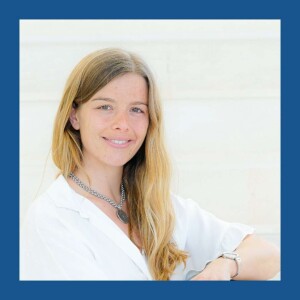
Thursday Apr 02, 2020
Thursday Apr 02, 2020
The biggest entrepreneurs are mothers in underdeveloped countries, figuring out creative and innovative solutions to ensure their families’ sustainability. We use sexy terms associated to tech and industry, but entrepreneurship is not “just for the illuminated” - it starts within.
Inês believes that by becoming the finest version of ourselves we are the best agents of change for a beautiful and memorable existence. She’s passionate about facilitating individuals' self-awareness, supporting a better understanding of others and the development of human and social skills. She is always up to a good challenge or project that has a purpose aligned with her values and an ensured ticket to develop new skills and enjoy the ride of life.
Within this scope, she is working with Insights Discovery as an Associate Consultant and with Chaperone as a Career Advisor. She is also collaborating with a Research Institute to develop a tech transfer program, nurturing her own natural entrepreneurial vein, and creating a new concept of event to empower health practitioners. She is a Board Member of the Portuguese National Young Entrepreneur Association and a Member of the Advisory Board of H-Partners for Life.
In her “past life” she was President of the Committee “Ethics in Health” in the Portuguese Health Parliament and worked in the FMCG and Pharma industries. She is doing an MBA and training to become a certified Coach. She has a Master in Medicine and a MOOC in Positive Psychology, is an Insights Discovery Licensed Practitioner and a NLP Practitioner.
Join the Papa PhD Postgraduate Career Exploration Group!
What you’ll learn about in this episode:
It's never too late to choose a new path
The importance of listening to your body, especially when it's hurting you
Why it is important to learn to tune out impostor syndrome and fear of humiliation
How meditation can help you in your decisions, but also in being a creative and productive professional
The importance of preparation when transitioning to a new domain
This episode’s pearls of wisdom:
“Listen to your body. This might seem strange, but your body is communicating with you all the time. And we don’t give it the attention or care we should. If it’s true that the magic happens outside of your comfort zone, your body will tell you where is the perfect spot to leave your comfort zone, staying honest to yourself.”
“Get your education and have the discipline of continuing learning from books and people even after you’re finished. Understand that university is way more than just theoretical knowledge being dumped on you. University is a laboratory – do that presentation that scares the shit out of you, ask that question that gets you sick to your stomach, get passionate fiercely.”
“People have this idea that you should clear your mind during meditation and, actually, what happens is that meditation clears your mind from toxic thoughts. And it creates space for you to come up with beautiful creative solutions and beautiful innovative ideas. And you don't even know that you have that inside of you if you don't creat space for it to happen.”
“The difference between a creative and an uncreative mind is not that the creative has different thoughts, but that the creative person actually takes what goes on their mind more seriously.”
“Prioritize sleep. Sleep is a super power, do not underestimate it.”
Inês’ links: LinkedIn.
Leave a review on Podchaser !
Support the show on Patreon !
You might also like the following episodes:
David (Viva Frei) Freiheit – Youtube content creator: PapaPhD.com/15
Tamarah Luk – Entertainment Law: PapaPhD.com/10
Kirsten Sanford – Science communication: PapaPhD.com/13
Inês Thomas Almeida – Musicology: PapaPhD.com/27
Launching your podcast?
If you're preparing to launch your podcast, you may be asking yourself what hosting platform to use.
I launched Papa PhD on Bluebrry because I wanted a professional service that would interface with my Wo...
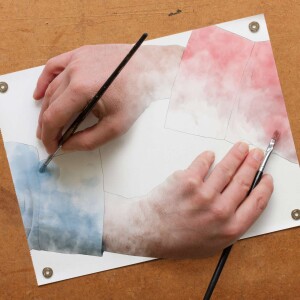
Thursday Mar 26, 2020
Thursday Mar 26, 2020
Vous n’êtes pas un être unidimensionnel. On a tous un intérêt, un penchant, un côté qu’on a mis sur pause ou qu’on cultive quand on peut, dans nos temps libres. Eh bien, parfois la vie nous offre la chance de mettre cette face cachée en premier plan et d’en faire une partie intégrante de notre vie professionnelle. Dans la conversation d’aujourd’hui, Carine Monat partage avec nous les aléas qui l’ont amenée de la biologie moléculaire au journalisme scientifique.
Carine Monat a réalisé son doctorat en neurobiologie à l’Université de Montréal. Férue de découvertes, de rencontres et de partage, elle est désormais journaliste et recherchiste scientifique pour plusieurs médias. Elle collabore aux émissions Moteur de recherche, sur ICI Radio-Canada première, et Ça me regarde sur AMI-télé comme chroniqueuse. Elle est également recherchiste scientifique pour Unpointcinq, le média de l’action climatique au Québec. Elle s’intéresse à la place des femmes en science, comme animatrice et réalisatrice du balado 20% avec Québec Science et l’Acfas, et dans un projet web avec l’ONF. Elle tient à la différence entre savoir et comprendre.
Joignez-vous au groupe d'exploration de carrières Papa PhD !
Ce que vous apprendrez dans cet épisode :
L'importance de choisir un cheminement académique qui va avec votre personnalité
Les critères à considérer quand on choisit un laboratoire
Le rôle important que joue notre réseau social rapproché pendant les études graduées
L'intérêt d'essayer différentes choses, des stages, du bénévolat, pour identifier le domaine dans lequel on aimerait travailler
À quoi ressemble le jour-le-jour d'un journaliste/recherchiste
Les perles de sagesse de Carine :
« Elle me disait "un échec, ce n'est pas tant un échec que tes limites." Elle, elle voulait faire astronaute - c'est quand-même intense. Elle a essayé, elle n'a pas réussi - elle m'a dit: "c'est pas grave, c'est juste pas pour moi, c'est ma limite, mais au moins, j'ai essayé." »
« Maintenant, l'avantage, avec LinkedIn et tout, c'est vraiment, je pense - il ne faut pas hésiter à les contacter. Les gens sont sur LinkedIn parce qu'ils sont à même de se faire contacter, sinon ils n'y seraient pas. Au pire aller, ils ne vous répondent pas, mais ça vaut la peine de tendre une perche. »
« Moi, je ferais, quand-même, des recherches - il ne faut pas, non plus, lancer des perches, comme ça, à tout va. Il faut être un peu pertinent, un peu renseigné, sinon vous allez vous noyer dans le lot des gens qui les contactent. Il faut savoir un peu ce qu'on veut en allant frapper à la porte de cette entreprise ou de ce labo de recherche-là. Et, surtout, il ne faut pas hésiter. »
Les liens de Carine : CarineMonat.com; Linkedin.com/in/carine-monat; Balado 20 Pourcent (Québec Science); @CarineMonat; Facebook.com/Carine.MonatReliat
Laissez une évaluation sur Podchaser !
Soutenez Papa PhD sur Patreon !
Vous aimerez aussi ces épisodes :
Joana Lobo Antunes – Communication scientifique (anglais) : PapaPhD.com/25
Kirsten Sanford – Communication scientifique (anglais) : PapaPhD.com/13
Simon Landry – Courtier de connaissances : PapaPhD.com/14
Valérie Levée – Journalisme : PapaPhD.com/38
Envie de lancer un podcast?
Mon ami et collègue podcasteur Marco Bernard et son Académie du Podcast ont ce qu'il vous faut si vous avez une idée, mais qu'il vous manque les connaissances pour mettre en place votre podcast.
Dans la formation Podcasting 101, Marco a préparé plus de 20 vidéos et des tutoriels où il explique quel équipement se procurer, comment faire le montage et comment le mettre en ondes sur les principales plateformes. Cliquez maintenant pour vous inscrire et avoir accès à la communauté !
Formation Podcasting 101 de l'Académie du Podcast
Dans la formation Podcaster Pro, il a pensé aux professionnels et créateurs qui non seulement veulent lancer leur podcast, mais ont des objectifs précis à atteindre avec celui-ci. C'est en pensant à eux qu'il a préparé plus de 80 v...

Thursday Mar 19, 2020
Thursday Mar 19, 2020
We're all drawn to science and graduate school for a reason. Because we're good at scientific subjects, because we want to discover new things, because we want to help others by developing technology and growing the knowledge base. It's our common thread as holders of master's or doctoral degrees. But not all of us end up fulfilling these objectives in the same manner after graduate school. In today's episode, James Bowers talks about how science brought him from the bench to science popularization, to the consulting arena in the science communication space.
James is a consultant and trainer at Agent Majeur, a science communication agency. Co-author of upcoming book “SELL YOUR RESEARCH – Public speaking for scientists” with Alexia Youknovsky, CEO of Agent Majeur, he has a PhD in Molecular Biology and an MSc in Science Media Production. Over his career, James has worked in TV production and is a communicator on “pop science” programs. At Agent Majeur, he trains in public speaking and science writing, consults on communication strategies and hosts events.
Join the Papa PhD Postgraduate Career Exploration Group!
What you’ll learn about in this episode:
How you can inspire people for life by teaching and mentoring them
How important it is to take action when mental health issues are affecting your well-being
How taking a short break from research can give you the mental space to regroup and take important career and life decisions
Taking on new challenges/side-gigs as a way to find your calling, gain new skills, and enter a new professional arena
This episode’s pearls of wisdom:
“I think that a lot of people who have been through a PhD can empathize with that situation where you've just had a very stressful time, and you're at your computer, and you stare at the screen, and nothing happens for hours. Nothing comes out, and you can't write, and you're just working on the same line, on the same sentence. After I'd kind of changed my mind about it offloaded a lot of my stress and worry, I then didn't have as much of those times, I was much more efficient, I gave myself more time off, I didn't force myself to come in too early or leave too late. I gave myself the physical and mental space I needed to take part in other things, which actually all kind of helped, itself.”
“You have to go in with no expectation of a result. So you go in and you test it, and you learn different things from different people. And if you release yourself of the expectation of some kind of success, or that it's going to do well, then you can just enjoy it more. And then you can really listen to your voice, inside, and say 'is this something I enjoy doing, or is this something that I feel like I have to do? And those two things are completely different.”
“The strategy, for me, was 'motivate yourself, because no one else will motivate you. Find the energy where you can.”
“Just be kinder to yourself. Don't be so hard on yourself.”
James' links: @jimbologist; @agentmajeur; www.agentmajeur.com/blog; “SELL YOUR RESEARCH – Public speaking for scientists”.
Leave a review on Podchaser !
Support the show on Patreon !
You might also like the following episodes:
Élodie Chabrol – Science communication (French): PapaPhD.com/33
Fiona Robinson – Patient education: PapaPhD.com/6
Kelly Bullock – Science illustration: PapaPhD.com/9
Kirsten Sanford – Science communication: PapaPhD.com/13
Launching your podcast?
If you're preparing to launch your podcast, you may be asking yourself what hosting platform to use.
I launched Papa PhD on Bluebrry because I wanted a professional service that would interface with my WordPress website, that would robustly broadcast Papa PhD to all platforms, and that would allow me to grow my podcast in years to come.
And these are the reasons why I'm recommending the Blubrry podcast hosting and syndication platform.
Click on the button below or use the promo code PapaPhDBlue on the Blubrry website to unlock a one mon...

Thursday Mar 12, 2020
Thursday Mar 12, 2020
Quand on change de domaine, on ressent souvent ce syndrome de l’imposteur, cette sensation d’être comme un cheveu dans la soupe. Et ça peut nous empêcher d’avancer et d’accepter des défis un peu en dehors de notre zone de confort. Dans cet épisode, Valérie Levée nous raconte le trajet qui l’a menée de la physiologie végétale au journalisme et à la rédaction en architecture.
Valérie Levée a complété sa formation universitaire en biotechnologie végétale à l'Université Paris XI, puis Université de Picardie et Doctorat à l'Université d'Orléans. Arrivée au Québec en 1996, elle a mené des recherches postdoctorales au centre de foresterie des Laurentides (Québec), puis elle a eu différents postes à l’université et en dehors du milieu universitaire. En 2007: réorientation professionnelle en communication scientifique. Depuis quelques années et après beaucoup d’expérience et d’apprentissage, Valérie s’est spécialisée en journalisme et rédaction en architecture. À part le travail, elle a un intense besoin d'aller jouer dehors!
Joignez-vous au groupe d'exploration de carrières Papa PhD !
Ce que vous apprendrez dans cet épisode :
L'importance de la persévérance dans les études doctorales
Le rôle que les activités extra-curriculaires pour trouver un équilibre et une vie sociale saine
Les associations professionnelles comme voies d'accès à un métier
Aller chercher des compétences professionnelles par le biais de formations
Comment l'université peut nous permettre d'ouvrir nos horizons
Les compétences douces qu'on développe au doctorat et au post-doctorat
Le jour-le-jour et les qualités d'un journaliste
Ce qu'on gagne à se permettre d'essayer le plus de choses possibles, professionnellement
Comment participer au programme radio « Futur Simple »
Les craintes reliées à la sécurité financière quand on sort du milieu universitaire
Les perles de sagesse de Valérie :
« On apprend plein de choses pendant qu'on fait un doctorat. C'est une leçon de vie, en fait. Ce n'est pas juste apprendre à faire des expériences et à tirer des conclusions, des résultats. C'est toute un leçon de vie qui, de toute façon, va pouvoir se projeter sur d'autres emplois ou d'autres activités, quels qu'elles soient à l'issue du doctorat. »
« C'est un peu trop facile de s'enfermer dans le département où on est. On est dans un laboratoire qui est dans un département, on est très préoccupé par nos expériences, on parle beaucoup à nos collègues et on oublie qu'il y a tout un monde en dehors de notre discipline et de notre département. »
« Il y a tellement de choses qui se passent dans toute sorte de disciplines et je crois qu'il faut profiter de toutes les conférences qui peuvent se donner, toutes les activités universitaires, qui peuvent nous permettre d'aller découvrir un autre sujet en anthropologie, en géologie, en linguistique, pourquoi pas ? Il faut profiter de ces opportunités-là pour s'ouvrir à toute sorte de disciplines, de sujets d'étude ou, même, de conversation pour enrichir, finalement, notre culture générale. »
Les liens de Valérie : Futur Simple; LinkedIn.
Laissez une évaluation sur Podchaser !
Soutenez Papa PhD sur Patreon !
Vous aimerez aussi ces épisodes :
Carine Monat – Journalism (French) : PapaPhD.com/40
Joana Lobo Antunes – Science Communication: PapaPhD.com/25
Kirsten Sanford – Science communication: PapaPhD.com/13
Simon Landry – Courtier de connaissances : PapaPhD.com/14
Envie de lancer un podcast?
Mon ami et collègue podcasteur Marco Bernard et son Académie du Podcast ont ce qu'il vous faut si vous avez une idée, mais qu'il vous manque les connaissances pour mettre en place votre podcast.
Dans la formation Podcasting 101, Marco a préparé plus de 20 vidéos et des tutoriels où il explique quel équipement se procurer, comment faire le montage et comment le mettre en ondes sur les principales plateformes. Cliquez maintenant pour vous inscrire et avoir accès à la communauté !
